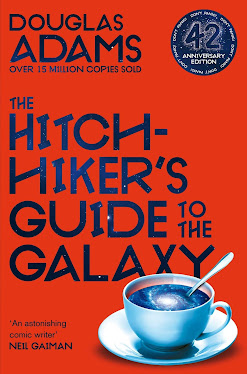Published on 12 October 1979, the novel was based on Adams's radio series of the same name which had aired eighteen months earlier on the BBC. With the radio series a huge success, Adams was convinced to turn the series into a novel. Adams only adapted the first four parts of the radio series into the book, saving the rest for the sequel, The Restaurant at the End of the Universe (published a year later), although, as was his wont, Adams made major plot and character changes between the different versions of the story. The same held true of the excellent BBC mini-series (which aired in 1981), the video game (1984) and feature film (2005).
The novel sold extremely well, shifting 250,000 copies in its first three months on sale. Unusually for a British comedic SF novel, the book was a hit in the United States as well and sales of the novel passed a million in 1984. Total sales of the novel are now believed to be in the neighbourhood of 20 million. The Hitch-Hiker's Guide to the Galaxy is one of the two biggest-selling individual SF novels* of all time, a position it has swapped fairly regularly with Dune in the last few years, although a recent boost in sales for Dune (driven by the new movie adaptation) have almost certainly moved it back into first place and Hitch-Hiker's into second.
As with most versions of the story, The Hitch-Hiker's Guide to the Galaxy novel opens with Earth being demolished by the officious and callous Vogons to make room for a hyperspace by-pass. Ford Prefect, a field researcher for the eponymous book who has been conducting research on Earth for fifteen years, elects to rescue his best friend Arthur Dent from certain death and they flee into deep space. After an improbable meeting with Ford's semi-cousin Zaphod Beeblebrox (the part-time Galactic President who's now on the run after stealing a hyper-advanced starship for no rational reason), they find themselves caught up in a wild, ancient conspiracy involving god-like computers, dolphins, mice, an alien fjord-designer and, of course, the number 42, which holds the key to the secrets of life, the universe, and everything. Or it would, if anyone knew what the hell the question was.
Sadly, Douglas Adams passed away in 2001 at the far-too-young age of 49 and is not here to celebrate the milestone his famous novel has achieved. However, I am certain that, demolition of the Earth by bad poetry-reciting aliens allowing, the novel will still be going strong in another 42 years from now.
* Sales estimates of The Hitch-Hiker's Guide to the Galaxy are complicated due to the fact that it is a very short novel, so for most of its existence it has been published in handy omnibus formats with various of its sequels; the biggest-selling edition of the book is believed to be a 1985 omnibus edition that packaged it with its three immediate sequels: The Restaurant at the End of the Universe (1980), Life, the Universe and Everything (1982) and So Long and Thanks For All the Fish (1984). After 1992, this was supplanted by a five-volume omnibus that added Mostly Harmless (1992), the final book in the series. In recent years, the series has seen new five-volume editions put on sale. However, Dune has a similar estimate problem due to the extreme popularity of a hardcover omnibus that contains the first three books in its series which has been in print since the late 1970s.

WOW!!! 42 years old and still the book i remember most fondly. I remember borrowing the LP's from my friend and listening to them all the time. I have a soft spot for the TV series too and it was watching the series that got me into the books. A wonderful read.
ReplyDelete